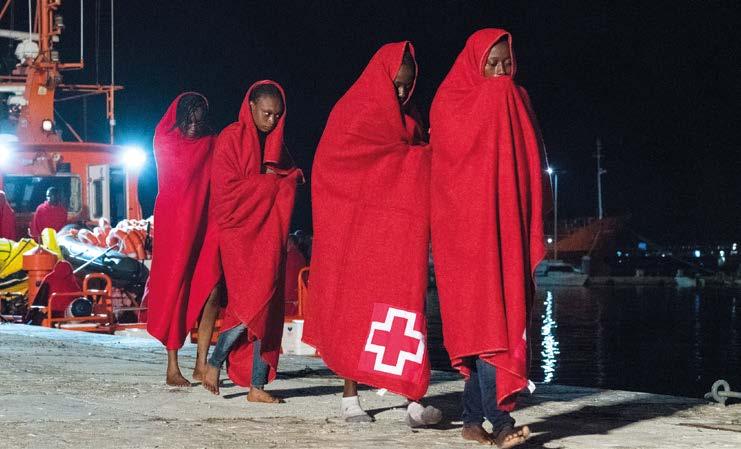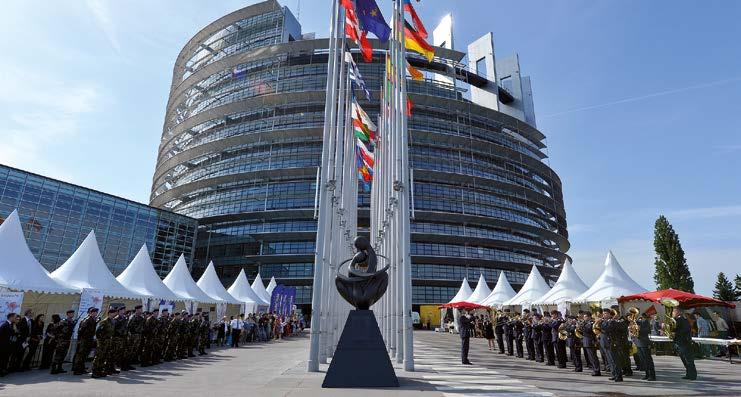
6 minute read
Josep Borrell i Fontelles, Madrid Migration: myth and reality How fear can conceal truths
Playing with fears can conceal truths Migration: myth and reality
22 by Josep Borrell i Fontelles, Minister of Foreign Affairs, European Union and Cooperation, Madrid
Societies are forged on the basis of major challenges. Europeans, including the Spanish, are today facing an unparalleled challenge. How we manage the phenomenon of migration will to a large extent determine the destiny of Europe, both in the future and the present. If we think about the European elections of May 2019, the truth is that it is not easy to debate with certain political representatives when their narrative on migration is not exactly defined by its intellectual rigour.
Playing with fears Such representatives have managed to establish in the collective imagination a reality that does not exist, and with not inconsiderable success: Orbán has been elected for the third time in Hungary, Zeman for the second time in the Czech Republic, Kaczy´n ski in Poland, AfD in Germany, Salvini in Italy, the threat of Bannon with The Movement and a project for Europe which carries on from Brexit, and the success of Liga Norte in Italy, all attempting to form in this way a large anti-Europe coalition. Fortunately, this is not the case, at least for now, in countries such as Spain, where the issue of migration does not divide society, nor has it given rise to xenophobic political parties. These politicians deal in terms of perception, and not an accurate analysis of reality. They play with fears that are capable of concealing truths. On 13 April 2018, the European Commission published the results of the Special Eurobarometer 469 survey on the “Integration of immigrants in the European Union”. According to the results, only a minority (37%) of Europeans believe that they are well informed on issues related to immigration and integration. The survey respondents also tend to overestimate the number of non-EU immigrants: in 19 of the 28 Member States, the estimated proportion of immigrants in the population is at least double the actual proportion, and in some countries the ratio is much higher. As George Orwell reminded us, our first duty in the face of threats to liberal democracies is to preserve the integrity of political language. Conversely, the first task that enemies of plural and open societies such as ours undertake is to pervert that same language. This has also happened with the issue of migration. But let us not confuse eye-catching headlines with reality. A misdiagnosis will lead us to an inappropriate response. The spikes in arrivals on Spanish, Greek and Italian coasts are not sporadic events, but form part of a recurrent and structural phenomenon.
Causes underlying migration It is a panorama of poverty (36 of the 41 countries from the group with the lowest level of human development are in Africa according to the UNDP’s Human Development Index), problems resulting from climate change (drought, which affects 22% of the population, floods, poor soil quality), lack of peace and security (the number of refugees on the continent, after having declined in 1995-2014, has doubled since 2015 and today there are 6 million African people who comprise 26% of refugees worldwide, and the majority of United Nations peacekeeping missions are in Africa) and unemployment, especially among youth and women. Naturally, the greatest of all the causes underlying migratory flows is the scarcity of economic opportunities to pursue a decent living in the countries of origin. Furthermore, as a result of being a developed economy with an ageing population, the EU has become a world destination for
migrants, and has attracted between 1.5 and 2.5 million immigrants per year from outside the EU, though these figures are in no way substantial; in relative terms they represent only between 0.3% and 0.5% of the total EU population (508 million).
A question of balance It is simply a question of balance. It is sufficient to recall that the population of Africa has risen from 477 million people in 1980 to 1,250 million in 2017, and is estimated to reach 2,500 million by 2050 and 40% of the world population by 2100. Meanwhile, in Europe we are witnessing a demographic winter and the ageing of our population, with Spain as an extreme example of these trends. By 2050, Europe will have lost 80 million people of working age and Africa will have gained 800 million. Only if we are aware of this reality and use precise, reasonable language to describe it, avoiding demagogic manipulations, will we be well-placed to transform this challenge into a great opportunity for Africa, Spain and the rest of Europe.
Towards an effective asylum system But to do so, we must acknowledge that to date, EU Member States have not been able to agree on a European response to this issue. The asylum system has had too many imbalances and shortfalls since long before 2015. The Dublin Regulation, which sought to streamline the application processes of asylum seekers pursuant to the Geneva Convention, was not conceived for the purpose of managing the high number of irregular arrivals of economic immigrants by sea. The reform of this regulation must be approved as soon as possible, including the permanent quota system. Consequently, we need to move towards a system that is effective and, among others, capable of reducing irregular flows, which requires, in addition to fighting the mafia, establishing additional channels for legal migration – a humanitarian
Josep Borrell i Fontelles
was appointed Minister of Foreign Affairs,
the European Union and Cooperation of
Spain in June 2018. He holds Bachelor’s
degrees in Aeronautical Engineering and
Economics, a Master’s degree in Applied
Photo: private
Mathematics from Stanford University and a PhD in Economics. Mr Borrell be
gan his political career as Secretary General for the Budget in 1982, followed by a series of positions in the Spanish government. From 1986 to 2003, he was a Member of Parliament for Barcelona and chaired the Joint Committee for European Affairs. In 2004, Mr Borrell was elected to the European Parliament, where he served as President of the Parliament during the first half of the 2004-2009 term.
system, a system that defends decent treatment of human beings and prioritises saving lives - a fair system, with a clear common dimension in management of the whole. Only in this way will we arrive at a shared migration policy as expressed in the Treaties.
An ultimate call on Europe Ultimately, Europe must, in the framework of a close association between the two continents, just as President Juncker has proposed, contribute more decisively to the long-term development of Africa, with respect to strengthening its institutions above all. In this way emigration can become a freely chosen option structured through legal and safe channels, and not a necessity arising from the pressure imposed on people by armed conflicts, widespread violations of human rights, citizens’ insecurity, or the lack of professional opportunities – especially for young people.
Definition of key terms
→ International migrant: “any person who changes his or her country of usual residence”
→ Refugee: “any person who […] owing to well-founded fear of being persecuted for reasons of race, religion, nationality, membership of a particular social group or political opinion, is outside the country of his nationality and is unable or, owing to such fear, is unwilling to avail himself of the protection of that country; or who, not having a nationality and being outside the country of his former habitual residence as a result of such events, is unable or, owing to such fear, is unwilling to return to it.”
→ Internally displaced persons: “persons or groups of persons who have been forced or obliged to flee or to leave their homes
or places of habitual residence […] and who have not crossed an internationally recognized State border”
→ Asylum seeker: person “whose request for sanctuary has yet to be processed”
(Ed/ak, Berlin)










